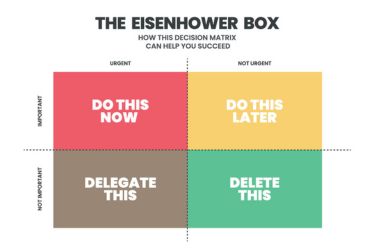The seventh habit in Stephen Covey’s well-known book, The 7 Habits of Highly Effective People, is called “Sharpen the Saw.” Sharpen the Saw teaches us that to be effective, we must regularly renew and take care of ourselves in all areas of life: physical, mental, social/emotional, and spiritual. Focusing on personal growth gives us more energy and helps us deal with life’s challenges.

If we constantly work without taking breaks to rest and improve ourselves, we become less productive and even burn out. Covey uses the image of someone sawing with a dull blade—the more we push without stopping to sharpen, the harder everything becomes. By making time for self-renewal, we keep ourselves sharp and ready to tackle our goals.
Key Takeaways
- Sharpen the Saw means looking after our whole self for lasting success.
- We should actively care for our physical, mental, spiritual, and social wellbeing.
- Small, regular habits can make a big difference in our daily lives.
Understanding Habit 7: Sharpen the Saw

Habit 7, known as "Sharpen the Saw," encourages us to invest in ourselves so that we can stay effective and resilient. It involves thoughtful actions aimed at both short-term wellbeing and long-term growth by focusing on renewal in several life areas.
Definition of Sharpening the Saw
"Sharpen the Saw" refers to maintaining and improving our greatest asset—ourselves. We do this by regularly caring for four key areas: physical, mental, social/emotional, and spiritual health. Just as a saw needs sharpening to continue cutting wood efficiently, we need self-care routines to remain productive and healthy.
- Physical: Exercise, nutrition, rest
- Mental: Learning, reading, problem-solving
- Social/Emotional: Relationships, empathy, self-esteem
- Spiritual: Reflection, values, purpose
If we neglect these four areas, we may find ourselves tired, less creative, and less able to handle challenges. By making time for renewal activities, we build our capacity and keep ourselves balanced.
Origins Within the Seven Habits
"Sharpen the Saw" is the final habit in Stephen Covey’s framework, "The Seven Habits of Highly Effective People". This habit ties together the lessons from the first six habits by promoting ongoing improvement.
Covey placed Habit 7 last because it supports the other habits. Without energy and focus, it is tough to be proactive, set goals, prioritise, or work well with others. Making time to "sharpen the saw" allows us to keep developing the skills we need for the other habits.
The habit is both personal and foundational. By investing in self-renewal, we create a solid base for lifelong effectiveness. The process is not a one-off event, but a regular part of our routines.
Significance of Self-Renewal
Self-renewal through "Sharpen the Saw" helps us prevent burnout and sustain our performance across all areas of life. This habit ensures that we have the physical stamina, mental clarity, emotional strength, and spiritual depth to face daily challenges.
Many of us neglect self-renewal, focusing only on tasks and goals. However, Habit 7 reminds us that continually caring for our wellbeing is not optional—it is essential to success.
By dedicating time to self-renewal, we are better prepared to adapt and grow. We can also better support others, make wise decisions, and handle stress with resilience. This ongoing renewal is what makes lasting effectiveness possible.
The Four Dimensions of Renewal

Personal renewal requires us to balance care in four main areas: body, mind, spirit, and relationships. By systematically investing in all of these, we can maintain our energy and stay capable of self-growth and positive action.
Physical Well-Being
Physical well-being is about taking care of our bodies through proper self-care. Regular exercise, getting enough sleep, and eating nutritious meals are key parts of this dimension.
Routine exercise, even just walking or stretching each day, helps us manage stress and stay fit. Sleep is not just rest; it helps our bodies repair and prepares us for the challenges ahead. Eating a balanced diet strengthens our immune system and keeps our energy steady.
We should also pay attention to small habits, like drinking enough water and avoiding too much processed food. These simple actions lay a foundation for physical strength and lasting health. When we look after our body, we are better prepared to face both daily tasks and long-term goals.
Mental Growth
Mental growth involves keeping our minds active and learning new things. Reading, studying, solving puzzles, and trying out new skills all help us stay sharp and adaptable.
Self-renewal here means stretching our minds beyond routine work. We might take on a new subject, practise a language, or attend a workshop to expand our knowledge. Learning helps us adapt to changes and find creative solutions, both at work and at home.
Taking breaks to relax, meditate, or reflect is also important. These moments allow us to process our thoughts and let new ideas surface. Mental fitness, like physical fitness, comes from habits and deliberate effort to keep improving.
Spiritual Enrichment
Spiritual enrichment goes beyond religion; it is about finding purpose, meaning, and inner peace. We do this through activities like meditation, reflection, art, spending time in nature, or acts of service.
This dimension helps us connect with our values. By regularly pausing to reflect on our lives, we remind ourselves of what matters most. Meditation or prayer can calm our minds and help us focus. Creative activities such as art or music can renew our spirits.
Acts of service and giving back can also fulfil our deeper needs. When we align our actions with our beliefs, we find greater satisfaction and direction. Spiritual self-renewal gives us resilience during challenging times.
Social and Emotional Health
Social and emotional health is about our relationships, communication skills, and emotional well-being. Healthy connections with family, friends, and colleagues provide support, trust, and encouragement.
We strengthen this area by practising empathy and good listening. Open, honest communication helps us build trust and resolve conflicts. We benefit from teamwork and synergy, experiencing more than we could achieve alone.
Self-care in this dimension includes managing our emotions, developing patience, and seeking help when we need it. Joining groups, volunteering, or just spending time with those we care about can lift our moods and increase our sense of belonging.
Paying regular attention to our social and emotional needs helps us handle stress, adapt to changes, and experience deeper happiness in our daily lives.
Practices for Physical Renewal

Physical renewal means making daily choices to look after our bodies. Taking care of our health with exercise, nutrition, and rest helps us feel energised and ready to handle life’s demands.
Exercising Regularly
Regular exercise keeps our bodies strong and our minds clear. We do not need expensive memberships or extreme routines. Instead, walking, cycling, swimming, or playing team sports all provide great benefits. Aiming for at least 30 minutes of moderate activity most days boosts both heart health and mood.
Muscle-strengthening exercises, such as lifting weights or using resistance bands, help us build and maintain muscle. We should also stretch regularly to keep our bodies flexible and reduce stiffness. Keeping active lowers our risk of illness, improves sleep quality, and helps us manage stress effectively.
Staying motivated can be challenging. Setting simple goals, tracking our progress, or inviting friends to join us makes regular activity more enjoyable. Making movement a consistent part of our routine pays off for our energy and well-being.
Eating Right
What we eat affects not just our weight but our entire well-being. To fuel our bodies properly, we need a balanced diet that includes a mix of whole grains, fresh fruits and vegetables, lean proteins, and healthy fats. Drinking plenty of water supports our body’s processes and keeps us hydrated.
Avoiding processed foods, excess sugar, and unhealthy fats helps protect our organs and keep our minds sharp. Taking time to eat meals without rushing can improve digestion and prevent overeating. Watching portion sizes also makes it easier to maintain a healthy weight.
It’s important to build consistent, healthy eating habits instead of relying on strict diets. Planning meals ahead, reading nutrition labels, or preparing food at home helps us have more control over what we consume. These small steps add up to big differences in how we feel day to day.
Getting Enough Sleep
Sleep is essential for our bodies and minds to recover. Getting seven to nine hours each night allows us to think clearly, manage emotions, and keep our immune system strong. Setting a regular bedtime helps us build a routine that supports deeper rest.
Creating a comfortable sleep environment is key. We should keep our bedroom cool, dark, and quiet, and avoid bright screens or caffeine close to bedtime. Relaxing before bed by reading, gentle stretching, or listening to calming music helps us wind down.
Missing sleep makes us tired, irritable, and less able to deal with challenges. By making sleep a priority, we support every other habit and boost our ability to live effectively. Choosing rest is not a luxury but a necessary part of sharpening the saw.
Strategies for Mental, Spiritual, and Social Renewal

Nurturing our minds, spirits, and relationships is essential for balanced growth. Through specific activities and habits, we can keep ourselves sharp, motivated, and well connected.
Enhancing Learning and Creativity
Regular learning keeps our minds active and alert. We can do this through reading books, focused study sessions, or thoughtful writing exercises. Setting aside time for studying not only increases our knowledge, but also trains our focus and memory.
Creative expression is equally important. We might engage in art, music, or creative writing to stimulate imagination and reduce stress. Sharing knowledge through teaching—whether mentoring a colleague or helping a friend—reinforces our understanding while helping others.
To encourage creativity, we can use simple approaches like mind mapping, brainstorming, or keeping a daily journal. Making these activities part of our routine strengthens our ability to solve problems and see new perspectives.
Building Meaningful Relationships
Meaningful social connections improve our emotional health and provide support when we need it. We can build these connections by actively listening, showing empathy, and making time for people in our lives.
Joining groups or clubs around shared interests promotes conversation and teamwork. Service—like volunteering or helping at community events—lets us give back, build trust, and develop empathy. These experiences help us understand different viewpoints and build respect for those around us.
Practising simple acts, such as thanking someone, offering genuine compliments, or being present during conversations, increases our sense of belonging. Regular positive interactions create lasting social bonds that enrich our lives.
Engaging in Reflection and Growth
Spiritual and personal growth often starts with quiet reflection or activities that help us look inward. We may use meditation to calm the mind, or spend time in nature to recharge our spirits.
Setting aside moments for silence or thoughtful writing allows us to review our goals, actions, and values. Many of us benefit from keeping a reflective journal, which helps track progress and clarify our thinking.
Being involved in acts of service, mindful prayer, or practices from our faith tradition brings purpose and a sense of connection. These habits increase our resilience, helping us manage stress and find meaning in our daily routines.
Continuous Improvement and Sustaining the Habit
To truly benefit from "Sharpen the Saw," we need ongoing commitment to self-renewal. Consistent improvement supports our growth across all areas, making each of the seven habits more effective.
Creating Lasting Change
Continuous improvement means always looking for ways to grow. When we sharpen the saw, we aren't just growing once, but working to develop better habits over time. This helps us avoid burnout and keeps us engaged.
To create lasting change, we should set small, clear goals for personal development. For example, reading for 20 minutes daily can expand our thinking. Tracking progress in a notebook or app helps keep us accountable.
We also benefit from reflecting on our actions each week. This habit shows us what is working and where we can improve. Making time for regular review makes our efforts more effective.
Integrating Renewal into Daily Life
Renewal is not something to save for holidays or weekends. We make the most progress when we build self-renewal into our routines.
Here are practical ways to do this:
| Area | Daily Action Example |
|---|---|
| Physical | Go for a morning walk |
| Mental | Read before bed |
| Spiritual | Meditate for ten minutes |
| Social/Emotional | Call a friend |
By making self-renewal a daily habit, we maintain our energy and focus. We must also remain flexible, adjusting our routines as our needs change.
Overcoming Common Barriers
We often face challenges like lack of time, motivation, or support. It is easy to let self-renewal slip when life gets busy.
To overcome these barriers, we can:
- Break tasks into smaller steps
- Ask for support from family or friends
- Use reminders or alarms to plan renewal time
When we recognise our obstacles, we can plan solutions. Staying consistent, even with small actions, helps us sustain the habit of continuous improvement. This way, we build a foundation for long-term growth and wellbeing.
Frequently Asked Questions
Sharpening the saw means taking time to look after our body, mind, emotions, and spirit. We focus on practical steps and real-life examples for students, workers, and anyone wanting to grow.
What are some practical examples of implementing 'Sharpen the Saw' in everyday life?
We might take a daily walk, read a book, or listen to music. Setting aside time for rest, reflection, and hobbies also helps us recharge. Keeping in touch with friends or family is part of building emotional strength.
How can students apply the 'Sharpen the Saw' principle in their academic pursuits?
We can manage our time so we get enough sleep, eat healthy meals, and exercise. Regular breaks while studying keep our minds fresh. Joining clubs or talking with classmates supports both learning and wellbeing.
In what ways can 'Sharpen the Saw' be integrated into professional development within the business sector?
We might attend workshops to learn new skills or schedule regular check-ins on our goals. Taking short breaks during work hours helps prevent burnout. Building relationships with colleagues can improve our teamwork.
Can you give examples of activities that embody the 'Sharpen the Saw' habit?
Examples include meditating, jogging, journaling, and volunteering for community projects. We might also take up a new language or creative hobby to strengthen our mental and emotional wellbeing.
What is the significance of 'Sharpen the Saw' in personal and professional growth?
Renewing ourselves helps us handle stress and learn more easily. In the workplace, it can improve our focus and effectiveness. Taking care of our different needs lets us achieve more and find more satisfaction in what we do.
Could you share a story that illustrates the impact of 'Sharpen the Saw' on an individual's effectiveness?
Consider someone who worked long hours and skipped breaks but eventually felt tired and less productive. When they began walking each morning and spending quiet time reading, their energy and mood improved. With these small changes, their work quality and personal life got better.

















